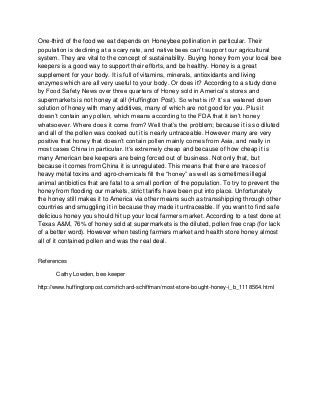
Bees wiki collin
- 1. One-third of the food we eat depends on Honeybee pollination in particular. Their population is declining at a scary rate, and native bees can’t support our agricultural system. They are vital to the concept of sustainability. Buying honey from your local bee keepers is a good way to support their efforts, and be healthy. Honey is a great supplement for your body. It is full of vitamins, minerals, antioxidants and living enzymes which are all very useful to your body. Or does it? According to a study done by Food Safety News over three quarters of Honey sold in America’s stores and supermarkets is not honey at all (Huffington Post). So what is it? It’s a watered down solution of honey with many additives, many of which are not good for you. Plus it doesn’t contain any pollen, which means according to the FDA that it isn’t honey whatsoever. Where does it come from? Well that’s the problem; because it is so diluted and all of the pollen was cooked out it is nearly untraceable. However many are very positive that honey that doesn’t contain pollen mainly comes from Asia, and really in most cases China in particular. It’s extremely cheap and because of how cheap it is many American bee keepers are being forced out of business. Not only that, but because it comes from China it is unregulated. This means that there are traces of heavy metal toxins and agro-chemicals fill the “honey” as well as sometimes illegal animal antibiotics that are fatal to a small portion of the population. To try to prevent the honey from flooding our markets, strict tariffs have been put into place. Unfortunately the honey still makes it to America via other means such as transshipping through other countries and smuggling it in because they made it untraceable. If you want to find safe delicious honey you should hit up your local farmers market. According to a test done at Texas A&M, 76% of honey sold at supermarkets is the diluted, pollen free crap (for lack of a better word). However when testing farmers market and health store honey almost all of it contained pollen and was the real deal. References Cathy Lowden, bee keeper http://www.huffingtonpost.com/richard-schiffman/most-store-bought-honey-i_b_1118564.html